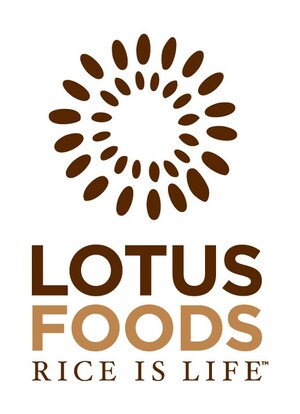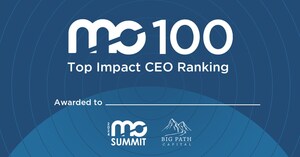Lotus Foods' Regenerative Agriculture Work Featured in Video Shown at COP27
RICHMOND, Calif., Nov. 14, 2022 /PRNewswire/ -- Lotus Foods has announced the Ellen MacArthur Foundation, a leading advocate for transforming our extractive linear economy into one that is circular, where waste is eliminated, resources are circulated, and nature is regenerated, features Lotus Foods as an example of a circular model in a video for the current U.N. Climate Change Conference (COP27). The video highlights Lotus Foods' efforts to mitigate climate change through regenerative rice production. It will be shown at various venues at COP27 and can be viewed at the Foundation's website.
"We are so honored that the Ellen MacArthur Foundation selected Lotus Foods to demonstrate how circular economy principles can tackle global challenges like climate change, biodiversity loss, waste, and pollution," said Caryl Levine, Lotus Foods Co-founder/Co-CEO.
Nick Jeffries, Ellen MacArthur Foundation Senior Expert, noted: "It's our hope that more companies will be inspired by the work Lotus Foods is doing. They show how regenerative agriculture can make a difference in the Global South as well as having a potential to significantly reduce emissions within a supply chain of a major global commodity."
Since 2008, Lotus Foods has been working with farmers who practice System of Rice Intensification (SRI) methods, which Lotus Foods calls More Crop Per Drop®. These methods minimize water usage, improve soil health, empower women, increase farm incomes, and reduce climate impact. In 2020, Lotus Foods demonstrated that its farmers using More Crop Per Drop® methods are "going beyond organic". The company's traditional White and Brown Basmati Rice, sourced from family farmers in northern India, became Regenerative Organic Certified™ (ROC™) Silver. It is the first rice to achieve this rigorous new standard, which promotes farming that enriches rather than degrades soil and values both animals and workers. More information about Lotus Foods' efforts to change the way rice is grown globally can be found in the company's latest impact report on lotusfoods.com.
"We are proud to keep the biodiversity of rice alive through creating markets for regeneratively grown heirloom rices," said Ken Lee, Co-Founder/Co-CEO of Lotus Foods. "We've seen it's possible to grow this amazing staple crop that feeds half the world's population in ways that benefit the farmer, the land, the community and the consumer who eats more nutritious rice. SRI means wealth for all stakeholders."
For more information, product offerings and recipes visit Lotus Foods online and follow on Instagram, Facebook, Twitter, Pinterest and TikTok.
Since 1995, Lotus Foods has partnered in direct and fair trade with small family farmers around the world who are growing rice more sustainably while preserving rice biodiversity. Lotus Foods' product line includes pigmented heirloom and organic rice varieties such as Forbidden® Rice, Jade Pearl Rice™, Red Rice, traditional Basmati and Jasmine Rice and Tri-color Rice as well as Rice Ramen, Pad Thai Rice Noodles and Rice Ramen Noodle Soup Cups. Products are available at major retailers nationwide. As a certified B Corporation, Lotus Foods is committed to "Changing How Rice Is Grown around the World" by focusing on rice grown using the System of Rice Intensification (SRI), which we call More Crop Per Drop®. SRI minimizes water usage, empowers women, financially rewards farmers and reduces climate impact. As a business co-founded and co-owned by an Asian American, and with a global supply network encompassing family farmers throughout Asia, Lotus Foods stands with the AAPI community and condemns racial violence.
The Ellen MacArthur Foundation is an international charity that develops and promotes the circular economy in order to tackle some of the biggest challenges of our time, such as climate change, biodiversity loss, waste, and pollution. We work with our Network of private and public sector decision-makers, as well as academia, to build capacity, explore collaborative opportunities, and design and develop circular economy initiatives and solutions. Increasingly based on renewable energy, a circular economy is driven by design to eliminate waste, circulate products and materials, and regenerate nature, to create resilience and prosperity for business, the environment, and society.
SOURCE Lotus Foods

WANT YOUR COMPANY'S NEWS FEATURED ON PRNEWSWIRE.COM?
Newsrooms &
Influencers
Digital Media
Outlets
Journalists
Opted In






Share this article